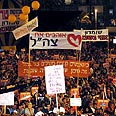
Songwriter Yaakov Rotblit of all people, whose popular "Song for Peace" became a symbol of peace dreams, was able to characterize this tendency better than anyone else.
In one of his least known songs from the 1970s, "Song for Peace Number 2," he takes a cynical look at the "peace industry" that developed in our country and shows contempt to the qualities and advantages the public attributes to peace. "Recommended, preferable, very healthy, tasty, fresh, makes life joyful, peace, peace, peace," he wrote.
Yet in recent years we have seen a suitable Zionist answer from the rightist-religious side of the political map. There too there is a readymade answer to any difficulty or problem: First it was the "despicable" Oslo Accord, and in the last year it was joined by the disengagement plan and events at Amona (or, if you will, the uprooting and expulsion plan, and the Amona riots).
The reserve army suffers from lack of training sessions? "But you had time to train ahead of the expulsion." There's no money for a longer school day? "But you knew how to find the money needed to throw us out of our homes. Equipment shortages at hospitals? "But you were able to equip the uniform-wearing thugs well." The train is late? "When you wanted to uproot us from our homes, you made sure to come on time."
Therefore, it isn't surprising to discover those who also found a direct connection between the escape of serial rapist Benny Sela and the disengagement plan.
In both cases, both on the Right and Left, there's nothing there aside from a superficial view of reality. Just like the settlements aren't the root of all evil and peace isn't the answer to all of Israel's problems, the disengagement or Amona are not at fault for the problematic situation we're currently facing, and even not at fault for the serial rapist's escape.
Some tough questions
The desire for easy solutions prevents us, the Zionist-religious public, from undertaking the genuine process of self-examination we so dearly need: How did we turn into the troublemaker of Israeli society? Why do parts of our leadership aspire to turn us from a leading, influential group to a disconnected, anti-establishment sector – a phenomenon mostly associated with the ultra-Orthodox community?
What's the conclusion from the disappearance of the magnificent settlements in Gaza Strip, as if they were nothing but dust? How should we understand the lack of solidarity with the evacuees on the part of the general public? What is the future of the settlement enterprise, in which we put our faith in recent years?
It would be childish to find an answer to all those questions in the secular public's McCarthyism or in the apparent death of secular Zionism. To our regret, the fault also lies with us (but not only with us.) We like to criticize the Israeli justice system for its attitude to young disengagement detainees, but forget to ask: Where are those children's parents?
We claim that we are law-abiding citizens and that we educate our children to honor the State, its representatives and its institutions, but we repress the displays of violence seen amongst us during those infamous encounters with security forces. We cry out over the tough attitude of security forces towards us, but prefer to forgot, for example, what happened to Arab road blockers during the September 2000 riots.
We can find signs of the righteousness of our path and the State's failure at every turn. We can find a connection between the disengagement and anything else that's happening around us, ranging from Benny Sela's escape to the paucity of rain in November.
We won't get far that way. As opposed to what can be expected, this conduct is not reminiscent of the child who yelled out "the emperor has no clothes," as religious-Zionist leaders argue when they talk about the country's leadership. Rather, it reminds us of that child who continues to pick at its wounds without thinking of how to heal them.
The writer is the chairman of the Realistic Religious Zionist Movement















